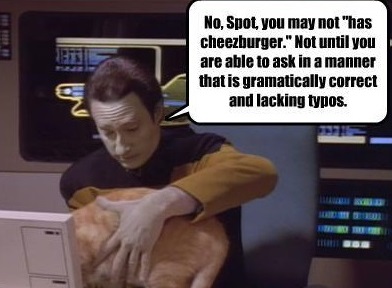A local restaurant has finally gotten a website up, and it’s one of the worst websites I’ve ever seen. Its spelling is so creative that — well, it includes words like “propetisioness” and “prok.” The overall quality of the writing is what you would expect of a website using the word “propetisioness.” It has no meta tags at all. Its design suggests that a bunch of random images were just stuck together till the space was filled. The basic information, such as hours and phone number, aren’t on the home page at all. The code is poor.
The question is: does this matter? The menu’s there, the phone number is on the Contact page, I went there and called and ordered food, regardless of how bad the website might be, so who cares what it looks like?
Well, Google seems to care.
This website is below the fold for my personal search for the name of the restaurant, even though both the URL and the title use the name of the restaurant, and even though I a) live just up the road and b) have been to the site before.
Google, we’re assured, doesn’t penalize for bad code, bad design, or bad writing. But they don’t have to make a direct penalty for these things to get in the way of good search results. Here’s why:
- Google’s goal is to choose quality. While there are fairly bad sites high on search for some things, a good site would quickly take their places if someone made one. In the case of this example, the restaurant’s own social media accounts, as well as all the directories they’re listed in, are above their own website. Google is, essentially, offering readers everything else it can find before offering this site.
- Links to your site affect your rankings, and people don’t choose to link to bad sites. I recently complained about having to link to bad math sites because I couldn’t find good ones. If someone puts up a good math site, will I rush over and change my links? You know it. A bad website just doesn’t entice visitors to link to it. If it’s bad enough, good directories will refuse it, too.
- People who can’t build a good-looking website won’t be able to build you a well-optimized website. The opposite isn’t always true, since there are web artists who know nothing about SEO. But someone without the skills to write and code your site correctly won’t have the more specialized skills it takes to build an optimized site. The site I’ve been telling you about made a 14 at Hubspot’s Website Grader, one of the lowest scores I’ve ever seen. They have a Moz rank of 0, no inbound links, and they’re not indexed. The people who built this site shouldn’t be calling themselves web designers.
Beyond that, there are physical-world issues connected with having a poor quality website. If you can fry chicken well enough (and this restaurant can) people who know about your chicken will come get that chicken no matter how bad your website is. People who don’t know about your chicken, however, won’t chance it. They’ll go to the place with a website that makes the chicken look good.


Leave a Reply